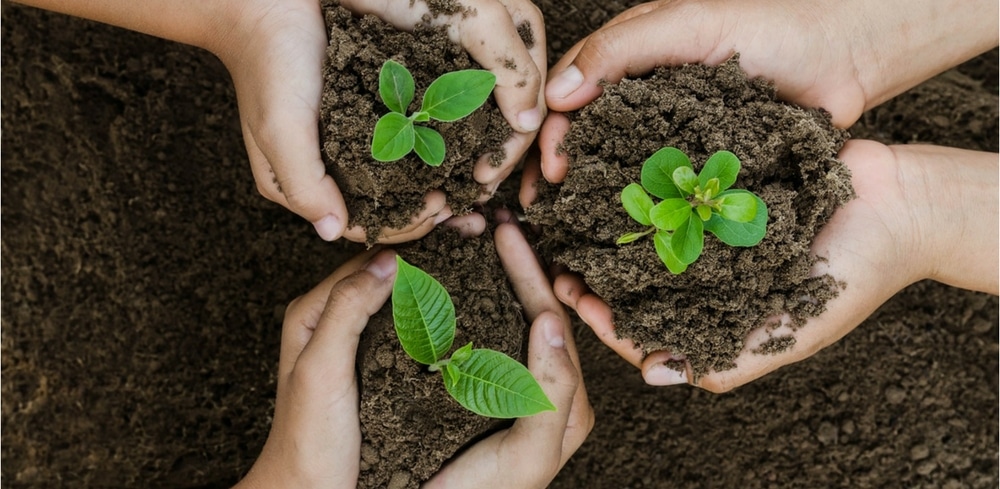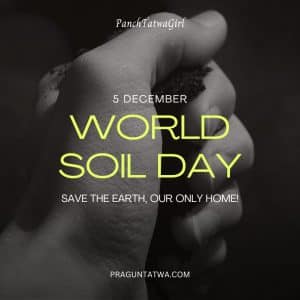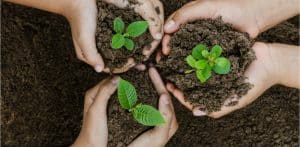How to Celebrate Soil Day

“Essentially, all life depends upon the soil… There can be no life without soil and no soil without life; they have evolved together.” – Dr. Charles E Kellogg, Soil Scientist and Chief of the USDA’s Bureau for Chemistry and Soils
As pollution rises across the world, the soil is also being affected. Around one-third of global soils have already been degraded. Soil pollution can be invisible and seems far away but everyone everywhere is affected due to it. With the population expected to reach 9 billion by 2050, soil pollution is a worldwide problem that is not only leading to the degradation of soil across the globe but is also resulting in the poisoning of food, water, and air. Soils have a great potential to filter and buffer contaminants, degrading and attenuating the negative effects of pollutants, but their capacity is finite.
Most of the pollutants originate from human activities such as unsustainable farming practices, industrial activities and mining, untreated urban waste, and other non-environmental friendly practices. We walk on it, dig into it, and build with it. We depend on it to grow food and clothing, filter water, and support natural ecosystems. Soil is essential to life. Join the American Society of Agronomy and Soil Science Society of America in celebrating soil! World Soil Day is celebrated every year on Dec. 5. The day focuses attention on the importance of protecting soil as one of our valuable, natural resources. You can make a difference, too! Check out the ways we can support Soil and Celebrate Soil Day.

World Soil Day, observed on December 5th each year, is a day to raise awareness about the importance of soil quality for human well-being, food security, and ecosystems. Here are some ideas on how you can Celebrate Soil Day:
Ways to Celebrate Soil Day
Educate Yourself and Others:
- Learn about the importance of soil health and its impact on food production, biodiversity, and climate regulation.
- Share your knowledge with others, whether it’s through social media, blog posts, or organizing a small community event.
Buy Organic
Every purchase we make is a vote for a system of producing food. Organic farms have been found to have, on average, 20% more organic matter in the soil. By buying organic you are voting for a system that is working towards achieving soil health.
Reduce food waste
The food we buy at the grocery store impacts the entire food supply system. One of the easiest ways we can support the soil is by limiting the amount of food that ends up in our garbage. All the food that ends up in our shopping carts requires land, water, nutrients, and energy to produce. By consuming more and throwing away less, we will prevent valuable nutrients from ending up in a landfill!
Organize Workshops or Seminars:
- Host workshops or seminars at local schools, community centers, or other gathering places to educate people about soil conservation, sustainable agriculture, and the importance of responsible land management.
Plant Trees and Vegetation:
- Participate in tree-planting events or start a community garden. Plants play a crucial role in maintaining soil health and preventing erosion.
Planting trees is one of the most efficient ways to conserve soil. As a plant grows, its roots tightly hold the soil and prevent its erosion by rain. The roots bind the soil and help in transpiring a huge amount of water.
Volunteer for Environmental Cleanup:
- Join or organize a local cleanup event to remove litter and pollutants from the environment. This helps protect the soil and surrounding ecosystems.
Promote Sustainable Agriculture:
- Support local farmers who practice sustainable and regenerative agriculture. Purchase products from farmers who use organic and environmentally friendly farming practices.
Eat a diverse diet
By eating different types of foods, we can help create demand for a wide variety of agricultural products, which is better for soil. Food diversity helps with biodiversity and soil fertility when land is used to grow multiple crops. For protein sources, the United States Department of Agriculture recommends varying “your protein routine.”
Perform Soil Testing and Restoration:
- Encourage soil testing in your community to assess soil quality. Work on projects to restore degraded soil through planting cover crops, using organic matter, and implementing erosion control measures.
If we are looking to fertilize our lawn or garden, we need to know what nutrients are already in the soil before applying more. We might be able to save money and apply less fertilizer. Or, we might just need to add one specific nutrient and not others. A simple way to get reliable results is to have our soil tested. Local university extension services can help provide information on testing soil. It’s usually a matter of scooping up soil from a few areas of the yard and sending it into the lab!
With the evolution of technology, scientists have been able to identify previously undetected pollutants, however, these technological improvements have also led to the release of new contaminants into the environment.
Compost
So maybe our eyes were bigger than our appetites at the grocery store, and we ended up with food we couldn’t finish. Instead of throwing it in the garbage, consider investing in a compost system! Composting can return nutrients in food back to nature. And, compost will be great for our gardens next growing season.
Documentary Screenings:
- Organize screenings of documentaries or films related to soil health and environmental conservation. This can be a great way to engage and educate a larger audience.
Art and Awareness Campaigns:
- Use art, whether it’s paintings, sculptures, or performances, to raise awareness about soil conservation. Artistic expressions can be powerful tools for conveying important messages.
Community Gardens and Planting Events:
- Initiate or participate in community gardening projects. This not only fosters a sense of community but also contributes to soil health and local food production.
Social Media Campaigns:
- Use social media platforms to spread awareness about World Soil Day. Share informative posts, and infographics, and engage with relevant hashtags to reach a wider audience to Celebrate Soil Day.
Read labels on lawn and garden products
Walking through the aisles of any home improvement or garden store, there is a seemingly endless array of products for our lawns and gardens. No matter which product we end up selecting, the most important step before applying is to thoroughly read the label and all instructions. Over- and under-application of the product can both cause problems.
Remember, the key is to promote sustainable practices and raise awareness about the vital role soil plays in our lives. Small actions can collectively make a significant impact on soil health and environmental sustainability. So this Soil Day don’t forget to do your bit and Celebrate Soil Day and let’s connect with our Earth.

From My Green Bag
To sum up, This is my conscious lifestyle post to spread more awareness about sustainable living. Join me for more such ways and tips and become part of my Conscious and sustainable living journey. Keep visiting my blog to make yourself eco-friendly, aware of conscious and sustainable choices, be more concerned for our environment, and alter your lifestyle.
To add on, read and listen to my Green Talks series and check out interviews with Eco-conscious people who are trying their bit towards conscious and sustainable living practices. There is so much to learn and explore from all of them I have interacted, do listen and drop in your views in the comments. Check here to learn more about all the Eco-Friendly dates.
Being Eco-Friendly is not a choice, make it a habit.
Without a doubt, sustainability is easier than you think. You don’t have to jump in by changing everything, start small to make the changes more eco-friendly, sustainable and a part of your daily life.








Recent Comments